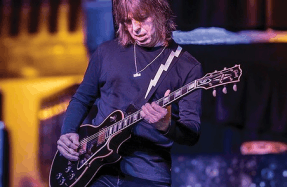
“GUITARS WERE DEPRESSING ME. EVERYTHING WAS DEPRESSING ME”
—JIM ROOT
For many bands that wrote albums during the pandemic lockdown, having extra time to compose and experiment was a bittersweet bonus. It allowed them to try new techniques, then revisit and fine-tune songs months after they were first tracked. Artists had the flexibility to upgrade their home studios and record in multiple locations. Fiddling while Rome burned provided a temporary escape from a decaying world and an outlet to funnel their anger and frustration. All good things in a tragic and frightening time.
Listening to Slipknot’s seventh studio album, The End, So Far, suggests the nine-piece wrecking machine benefited from such a chance to explore a wide range of musical options, from moody and melodic elegies to vicious and chaotic tirades. Throughout the record, ambient, effect-laden sounds collide with chuggy, downtuned riffs and tempos reel from sluggish to torrential, often in the same song. Like their last album, 2019’s We Are Not Your Kind, atmospheric interstitials are bookended by a schizophrenic hybrid of pop hooks, raging riffs and enough rhythmic variation to bewilder and enthrall.
“We’re not just five guys up there playing metal songs like, say, Anthrax, Exodus or Testament. There’s so much more going on,” says guitarist Jim Root of Slipknot’s sawed-off-shotgun-to-the-head approach. “There’s orchestration going on with [keyboardist] Sid [Wilson] and [DJ and sampler] Craig [Jones]. There’s melodic vocals and screaming and piano and samples and all these layers and music styles.”
The End, So Far may not be Slipknot’s most accessible album, but it’s arguably their most eclectic and enduring, an inescapable, enigmatic nightmare of sound that alternately soothes, stomps and slashes. Many of the songs will instantly appeal to fans of the band’s tribal death, thrash and new-American-metal classics like “Pyschosocial,” “People = Shit,” and “Duality.” However, hordes of “maggots” (the historic die-hards) will likely be dismayed by some of the other tracks. Slipknot seem to take a perverse glee in this inevitability, which may explain why they open the album with “Adderall,” a melancholy, cinematic cut redolent of Radiohead and Trent Reznor. Sampled choir snippets merge with layered atmospheric guitars, fraying the nerves without a single distorted power chord. Elsewhere, “Medicine for the Dead” blends warbling industrial noises into a melange of evocative arpeggios, clanking xylophones and palm-muted guitar chugs, and “De Sade” intertwines militant beats, a honey-sweet chorus and glistening guitar shards with shreddy leads. The End, So Far includes bluesy bits, some soulful crooning and tons of swooshing, pulsing effects you definitely won’t find on an Anthrax album.

“I don’t think we intentionally did anything to piss anyone off,” says second guitarist Mick Thomson. “But I know some people are gonna hate it, and I don’t give a shit about what they have to say on the Internet about how much I suck. I don’t even read anything on there that has to do with music [imitates blog post]: ‘Fuck those guys! Fucking sellouts!’ [implies blasé response]: “That’s fine. That’s wonderful. Have a great day. Oh, and your mom says you gotta fucking take the garbage out after your fucking homework’s done.”
Considering the intricate yet coherent results, what’s most striking about is that Slipknot had neither an abundance of time to work on the album nor a surfeit of material to choose from. When they entered the studio






